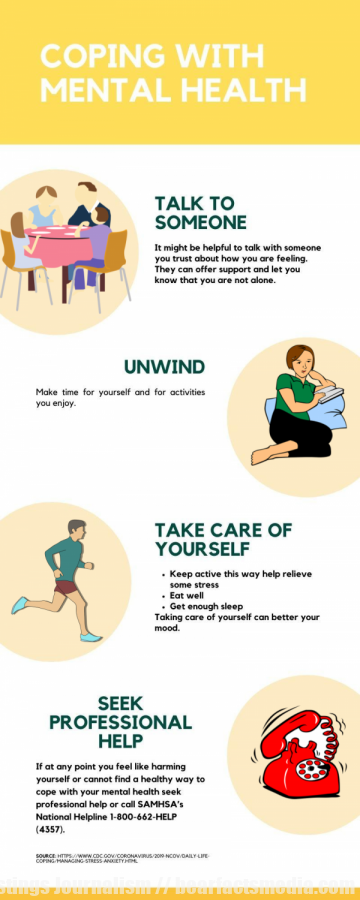Students struggle with mental health amid pandemic
Closures, lockdowns and quarantine have brought mental health awareness to the forefront of teen minds.

Many students are accustomed to waking up, getting ready, catching the bus to school, eating breakfast in the school’s cafeteria, socializing with teachers and friends in and out of the classroom, and eventually leaving school – just to return the next morning. Suddenly, from one day to the next, lives were completely uprooted.
As the number of confirmed Covid-19 cases continued to rise rapidly, schools were forced to close in order to protect staff, students and their families from contracting the virus. Before the pandemic, students had an established routine and interacted with other people at least once a day. While many might have stayed home even when there wasn’t a pandemic to worry about, now most are confined to their homes and can only go out when necessary. This has led to a rise in mental health concerns and has played a role in making the pandemic increasingly difficult to cope with.
According to a survey conducted by American Civil Liberties Union (ACLU), the number of students who rated their mental health 3 or lower tripled after the pandemic began. This is concerning because trying to cope with your mental health at home can be especially difficult without the resources or skills to make it a priority.
Many students have begun to express their concern about uncertainties that come with the pandemic. For instance, Jose Garcia, a senior, feels that the spike in mental health due to covid-19 should “be seen as priority [because] many people suffer dearly from this and could lead to many bad choices,” including death.
Garcia has struggled with depression and anxiety. Although he no longer suffers from depression, he continues to struggle with anxiety on a daily basis.
“Covid has increased the difficulty to control my anxiety due to the constant threat of getting covid,” said Garcia.
He’s not alone in this sentiment. Emely Morales, a senior, has also been struggling with dealing with her anxiety and stress that comes from school and the pandemic. Before the pandemic she went outside or used school as a distraction from her issues, it helped her clear her mind from any negative thoughts and allowed her to focus on something else rather than the negative thoughts invading her mind.
“People need some time to stop thinking about [their] problems,” Morales said.
Morales said she feels that the pandemic has made it increasingly easier for negative thoughts to enter your mind and to dwell on them because of the lack of interaction with the outside world. Despite the pandemic making it increasingly harder to deal with one’s mental health, many have found innovative ways to manage their mental health problems.
“I have discovered new ways to deal with my mental health issues from playing video games….and talking about them to my sister Samantha,” Garcia said.
Even though it has become hard to cope with mental health problems one thing that may help is to talk it out with someone. Instead of internalizing all of your issues, try to speak with someone you trust whether it’s a family member, close friend, or a teacher. They will be there to offer you support. Sharing with someone what you have been struggling with will help you because you’ll know you are not alone. If that isn’t something you are comfortable with, maybe try doing what Morales does to cope with hers. She takes time every day to write down something good that happened to her. In doing so, she focuses on the positive aspects of her life rather than the negative.
“I have learned…that whatever you are feeling right now may not be the same thing that you are going to feel tomorrow,” Morales said. Morales advises others to not make a rash decision because you never know what tomorrow awaits.
For more information on how to cope with mental health amid the pandemic go to cdc.gov.
Your donation will support the student journalists of Alief Hastings High School. Your contribution will allow us to purchase equipment and cover our annual website hosting costs.

Julissa Frausto is a senior at Alief Hastings High School where she is part of the school’s newspaper staff and takes on the role of section editor for...








